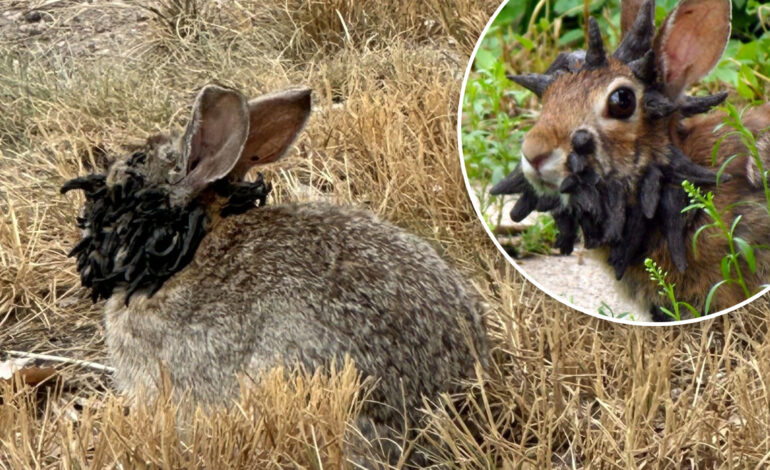Urgent Warning: ‘Frankenstein’ Rabbits Invade Colorado — Stay Away!

UPDATE: A disturbing outbreak of mutated rabbits, dubbed “Frankenbunnies,” is spreading in Fort Collins, Colorado. Residents are urged to avoid contact with these animals as they exhibit grotesque black, tentacle-like growths sprouting from their heads.
The alarming phenomenon is caused by the cottontail papilloma virus (CRPV), also known as Shope papilloma virus. This virus leads to the development of tumors around the heads of cottontail rabbits. Colorado Parks and Wildlife officials report that the virus is transmitted through bites from parasites like fleas and ticks, primarily during the warmer summer months.
Local resident Susan Mansfield shared her shocking experience with 9News, describing a rabbit with “black quills or black toothpicks sticking out all around his or her mouth.” She was astonished to see the same rabbit return for a second year, with its condition worsening. Another observer noted the rabbit appeared to have a “scabbiesh-looking growth” over its face.
While the recent sightings have been concentrated in Colorado, the disease has been known to affect rabbits throughout the Midwest. A notable instance occurred in 2013 when a Minnesota resident gained attention after posting a video of a similarly afflicted rabbit, coining the term “Frankenstein bunny.”
Wildlife experts warn that while the CRPV can spread among rabbits, it poses no risk to humans or pets. However, the condition can lead to severe health issues for the rabbits themselves. The protrusions can become so large that they hinder the rabbit’s ability to eat, leading to starvation and death, as reported by the Daily Mail.
Infected domestic rabbits are particularly at risk, as they may develop squamous cell carcinoma, a serious form of skin cancer. Experts strongly advise pet owners to keep their rabbits away from wild ones to prevent infection. If a domestic rabbit is infected, veterinarians have the option of surgically removing the growths before malignancy occurs.
With no known cure for CRPV, the situation remains critical. Colorado Parks and Wildlife emphasizes the importance of not approaching or handling any rabbits displaying these symptoms. Residents are encouraged to report sightings to local wildlife authorities to help monitor the outbreak.
As this situation develops, authorities will continue to provide updates on the spread of the virus and its impact on the rabbit population. Stay tuned for the latest developments regarding this urgent wildlife health crisis.





